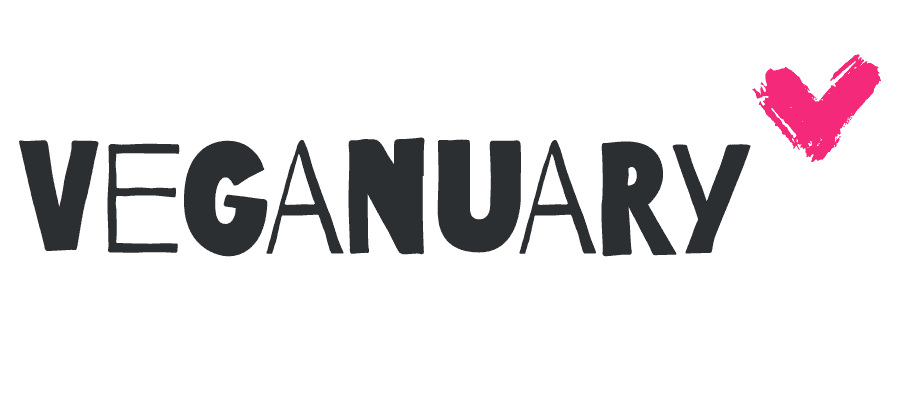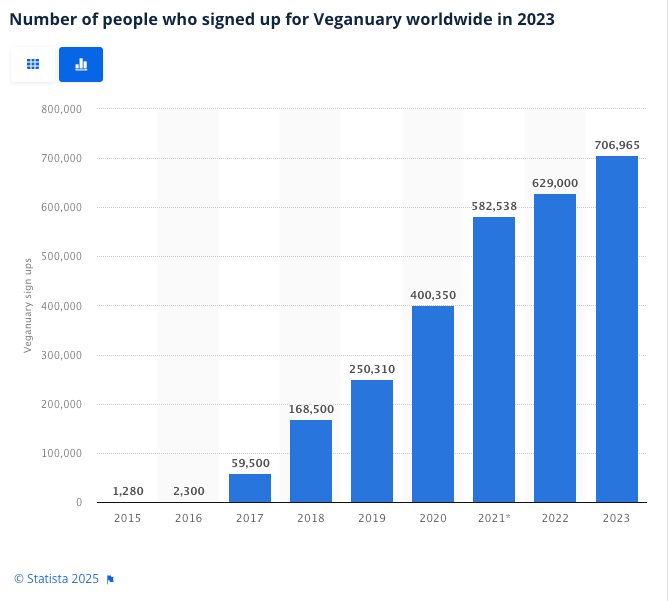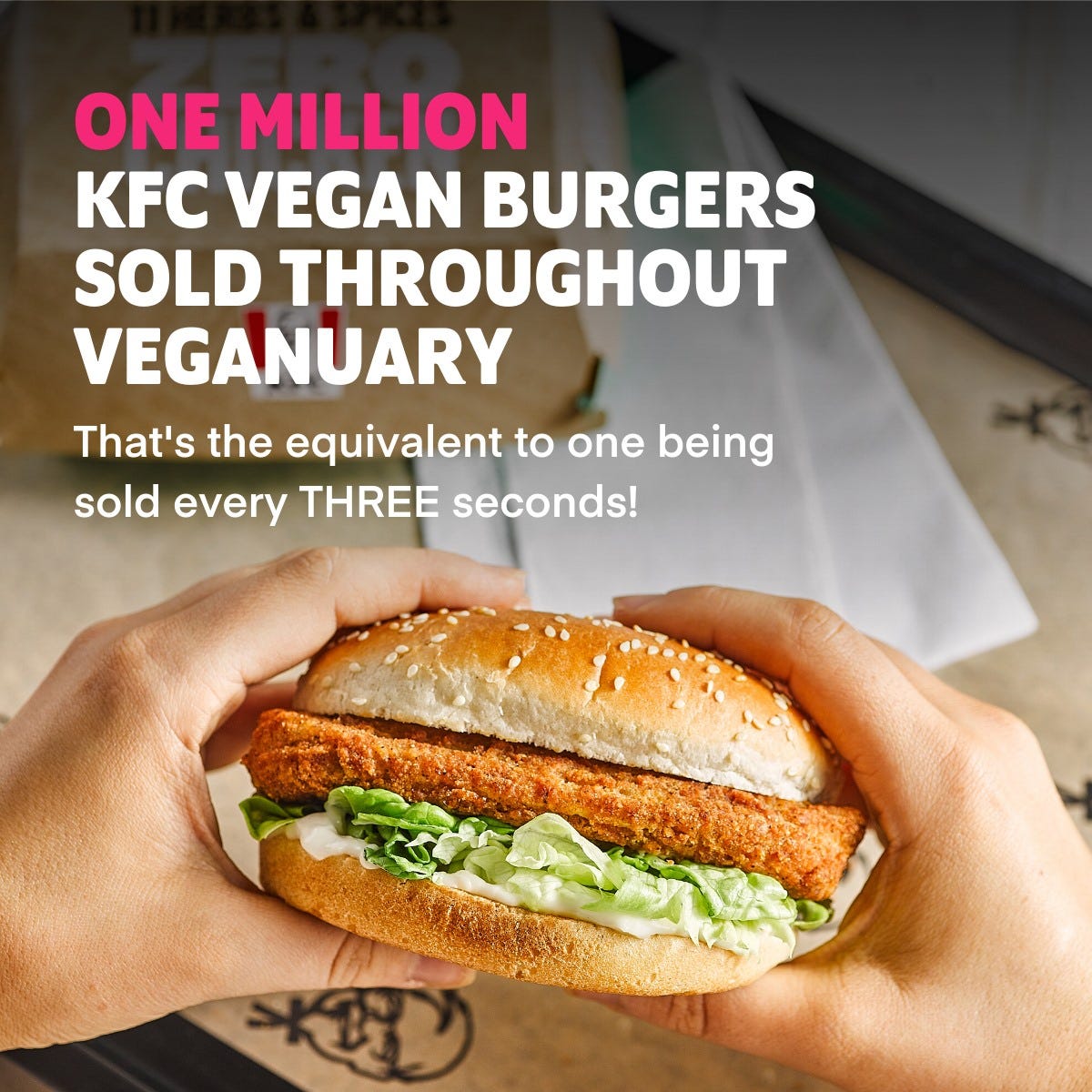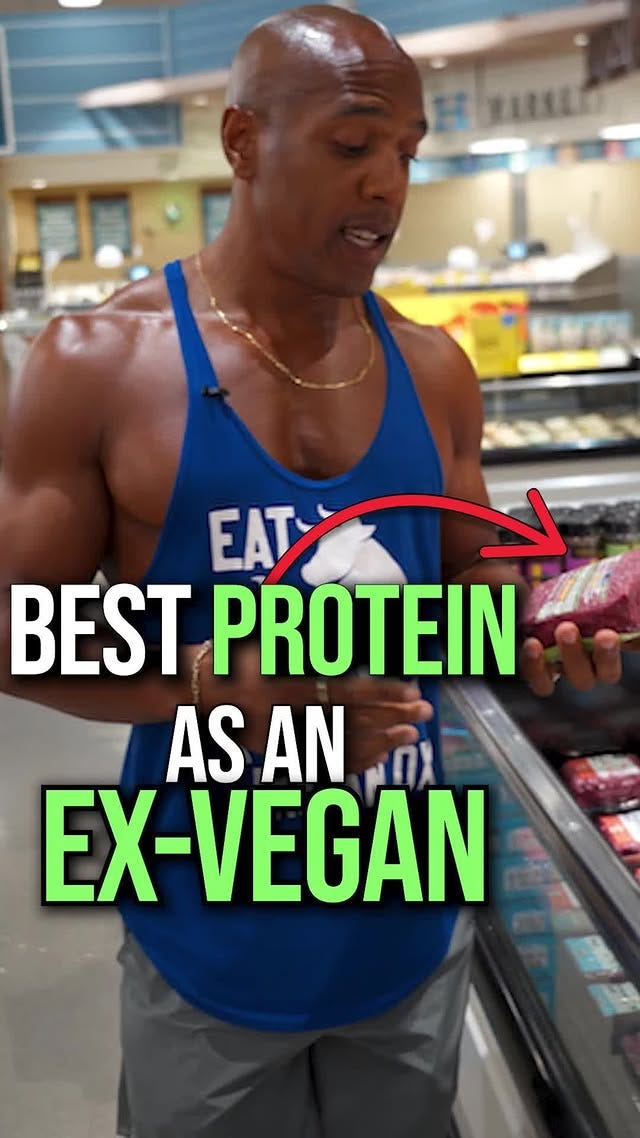The Problem With Veganuary
Does it help or hurt the animals?
When you read my Substack articles, you’re getting a window into my evolving thoughts—some freshly formed, others rooted in years of experience. I don’t claim to have all the answers (even if it seems that way at times), and I invite you to engage with my ideas as just that: thoughts worth considering.
2025 marks another year of Veganuary, the annual challenge encouraging people to embrace animal-free eating for a month. But not everyone’s cheering. Some vegans argue that Veganuary waters down the vegan cause, and even harms animals. Are these claims valid, or is Veganuary a stepping stone for change? That’s what we’re exploring today.
Who is behind Veganuary?
Veganuary was co-founded by Jane Land and Matthew Glover. I have met and interviewed Matthew, he is a dedicated vegan who also founded Generation Vegan (formerly Million Dollar Vegan) and Veg Capital, a financial group that helps fund vegan businesses. Matthew also founded Vegan Fried Chicken (VFC), a popular vegan chicken food brand that’s gained popularity across the UK and Europe. Matthew is also an on the ground activist. He’s conducted his own investigations, including exposing the chicken farms that supply KFC.
I interviewed Matthew about two years ago, and found him to be incredibly passionate, well-informed and committed to bringing about change for animals. You can find that interview below.
Now let’s explore the main concerns from critics of Veganuary.
Concern: Veganuary has nothing to do with veganism
This is quite a common criticism of Veganuary within vegan circles, but where does it come from? Well, the claim is that as Veganuary is basically a challenge to eat animal-free foods during January, it doesn’t encapsulate what veganism is. Veganism is more than a diet, it’s a rejection of using, abusing and killing animals, and applies to many other aspects of our lives (entertainment, clothing, cosmetics etc).
Critics worry that Veganuary blurs the meaning of veganism, reducing it to a diet and overlooking the broader ethical stance against exploiting animals. This, they argue, ultimately harms the animals it aims to protect.
As much as I empathise with this critique (I have avoided using food challenges like Veganuary and Challenge22 in the past with similar reasoning), I no longer agree with the conclusion that challenges like these are bad for animals.
Veganuary may be mis-using the term “Vegan” by labelling a food challenge with it, but their overarching goal is in fact to promote vegan ethics and create more vegans. Veganuary is a strategy, not an end goal. The goal isn’t to get people to try eating animal-free food once a year, it’s a strategy to get people to look deeper into why people eat animal-free diets in the first place.
It encourages the behaviours that will hopefully lead someone to switching to animal-free food, and going vegan. Veganuary acts as a starting point in someone’s journey of change for animals.
For example, a slaughterhouse investigator who identifies as a vegan animal rights activist doesn’t suddenly become a non-vegan when they infiltrate a slaughterhouse as a worker and participate in the slaughter. We know they are doing this as part of their undercover work in order to document and expose what happens to these poor animals, so that the movement can use the footage and information to raise awareness and fight for animals.
This strategy involves partaking in highly “non-vegan” activity, but at no point should we be criticising them for “not being vegan enough”. We understand the long-term goal, and I believe it’s important we also do this for other strategies that may not appear to be “vegan enough”, such as with Veganuary and Challenge22.
And regarding the concern that challenges like Veganuary only focus on food; while I understand this is a valid concern when considering the meaning of veganism, we need to keep our goal in mind. If our goal is to drastically change the world for animals, it’s clear that diet is the area we need most of our focus on.
Concern: Veganuary dilutes veganism
This critique is more focused on the idea that Veganuary undermines veganism by painting it as a trend or a diet fad. By having January as the “month to go vegan”, veganism becomes a novelty, a silly thing that people do every January for a bit of a change or to start the year off in a healthy way (based on the idea that a lot people have of veganism being a health diet movement).
Critics suggest that treating veganism as a passing trend undermines the deeper ethical foundations, and this could make people more likely to revert to animal consumption once the novelty wears off.
While it’s true that many people likely see Veganuary in this way, joining in as a yearly tradition for their own personal reasons, I’m not entirely convinced this has a net-negative impact for animals.
When it comes to eating animals, it appears that behaviour drives belief. Most people eat animals because they eat animals, and when asked why, they tend to make up reasons to eat animals right there on the spot. This is why we see the same 30 or so excuses in practically every corner of the world. I’ve heard “plants have feelings” and “our ancestors ate meat” in India, Thailand, the USA, the UK, Spain, Portugal, Germany, France, Finland, Sweden… you get the point.
I believe getting people to change their behaviour, regardless of the belief behind it, can be powerful in creating long-term change. This appears to be backed by research into human behaviour, this review article looking at 401 meta-analyses covering over 42,000 studies involving over 7 million people found that learning behavioural skills and forming habits showed stronger correlations with actual behaviour change compared to gaining knowledge or a general change in attitude. It also found that ensuring access to resources, as Veganuary does, shows the largest effect on behaviour.
And where behaviour change is concerned, Veganuary has succeeded. In 2024, 1.8 million people signed up or engaged with Veganuary for help switching to an animal-free diet. That’s 1.8 million people who committed to trying animal-free food. Most animal advocates would kill to have this kind of impact, and the number is growing year on year.
I believe this success is largely because of leaning into the New Year resolution trend and fashionable changes people like to make in early January. It’s a clever strategy to piggyback the grand, often highly optimistic commitments people make to the new year, and direct them to more animal-friendly commitments.
Concern: Veganuary exploits animals for profit
This criticism is less about the official Veganuary group, and more about the cultural impact Veganuary has. Every January, especially in the UK, businesses that are otherwise entirely unethical where animals are concerned capitalise on the popularity of Veganuary. They add exciting animal-free options to their menus, some even adding an entirely animal-free menu, all with the intention of squeezing as much profit out of the campaign as possible.
Some would call this “green washing”, a term usually used for when a business tries to appear environmentally friendly for profit. As we are referring to the impact on animals here, we could refer to it as an extension of “humane washing”, when businesses try to appear to be ethical or humane to animals for profit. The issue critics raise here is that these businesses are profiting from ethically minded people while they continue their unethical practices to animals.
This is a difficult one for me, as again I completely empathise with the concern. I’ve held this exact concern in the past, at one time I refused to eat at non-vegan restaurants or buy from particular companies that engaged in “humane washing” (I still don’t like buying products from Ben and Jerries for example).
But to put this into perspective, I think we need to ask some questions;
Would we prefer these companies didn’t offer animal-free choices?
Would we prefer they didn’t promote delicious vegan food?
Would we prefer they never served vegan food, as opposed to only serving vegan food for one month a year?
My answer to all these questions is a confident no. I feel like in most cases the decision to purchase the vegan option from a non-vegan restaurant or company is more of a personal choice than an ethical or unethical one. I can’t see how businesses promoting and celebrating animal-free options, even if only for one month a year, harms animals more than them never offering these options.
Regardless of their intentions, they’re putting animal-free food on the menu for hundreds of thousands of people. Bear in mind that some of these animal-free dishes are impressive, delicious dishes that help dispel the myth that “vegan food is boring”. Add that to the fact that many of the businesses that take part are big well-known brand names, helping to normalise animal-free food.
Inside and Outside goals
No strategy for advancing animal rights will ever be flawless. Mistakes will be made, debates will be had, but the key is to remain united in our mission. When it comes to Veganuary, I feel the problem is less about them and their strategy, and more about our misunderstanding of it.
To understand a campaign like Veganuary, it’s essential to distinguish between “outside” goals - what the public sees - and “inside” goals, which reflect the deeper strategies at play.
I’ll give you two examples and be warned, the second example is quite controversial.
The goals of Veganuary
Firstly, let’s take a look at Veganuary’s goals:
Outside Goals:
Get people to eat animal-free food for a month, or to at least try animal-free food
Inside Goals:
Normalise animal-free food
Get people to form animal-friendly habits and behaviours that help them more easily adopt veganism
Raise awareness of the ethical, health and environmental costs of animal based food and agriculture
Make the world a better place for animals
If we only focus on Veganuary’s outside goals, we might be tricked into thinking it’s a pointless, even insulting idea. “Try animal-free food for a month? Animals are dying! How can you treat this like some kind of game?” But when we look at the inside goals, we can see the truth - that Veganuary is just one of the tools we can use to change the world for animals.
Vegan influencer promotes meat?
Now for that controversial example. Vegan influencer Korin Sutton posted a video last year that caused a lot of backlash from the vegan community. In this video, he explains what he would eat if he became an ex-vegan. With animal flesh in hand, he goes over what he considers to be the nutritional benefits of each of the packets he picks up, before moving on to explain the animal-free foods he would keep in his diet. He then gives a recommendation for vegan chicken, mushroom steak, and tofu.
The caption reads:
Top Protein Picks for Ex-Vegans: A Balanced Plate! 🍖🌿
Thinking about dropping veganism but still want to stay ripped? Here’s how I’d keep those gains strong with the best proteins post-vegan!
A lot of people quit veganism because they feel weak or aren’t hitting their muscle goals. But is meat really the answer? And if it is, what’s the best way to stay lean without piling on the fat? Let’s break it down.
First, I’d grab bison — lean, natural, and packed with 22g of protein per serving, but only 12g of fat. 💪
Next is grass-fed ground beef, the 93% lean version with no added hormones. It’s a great source of protein without the greasy aftermath. 🥩
But don’t think I’d ditch plant-based protein completely! I’d still mix in @liveabbots chopped chicken and @meatifoods mushroom steak for a balance of nutrients.
And let’s be real — tofu isn’t going anywhere. Forget the myths about tofu lowering testosterone, it’s loaded with plant-powered protein. 🌱
👇 Ready to mix it up and keep your gains? Drop a “PROTEIN” in the comments, and I’ll help you build a high-protein plan that blends the best of both worlds!
Now I personally share a deep connection with animals, so being totally honest, seeing this content from a vegan creator bothered me. Even watching now I feel uncomfortable. The first time I saw it I was screaming in my head “how could you, a vegan, just dismiss the animals like this! How could you turn them into products on a shelf like everyone else does! You should know better!”
Did Korin Sutton all of a sudden just stop caring about animals, despite many of his other videos where he clearly shows he understands veganism, and is a vegan himself? Looking past the initial shock for a moment, let’s think about what the inside and outside goals of this post could be:
Outside Goals:
Encourage people to eat organic grass-fed meat
Encourage people to also eat vegan chicken, mushroom steak and tofu
Inside Goals:
Reach an online audience that vegans normally can’t reach
Expose hardcore meat eaters to animal-free food
Gain trust from hard to reach non-vegans by appearing relatable
Increase chances of hardcore meat-eaters seeing pro-vegan content
Do I think the ends justified the means in this case? I’m not entirely convinced, but I think the strategy was based on good foundations. So goes the saying “you attract more flies with agave than with vinegar” (veganised version). When people feel you’re on their side, it’s often easier to have a positive impact on them than if they perceive you to be their enemy.
Did Korin’s post achieve these inside goals? I guess only he knows that, but this isn’t a strategy I’d personally feel comfortable using. But even though I wouldn’t be comfortable doing something like this, it may be an effective long-term strategy to create positive change for animals. That’s to be seen. This is why considering the inside and outside goals, and not jumping to conclusions or harsh criticism, is so important.
Should you use Veganuary in your advocacy?
Veganuary is just another tool in the toolbox for vegan and animal advocates, and whether you decide to use it or not is completely up to you. What is clear though is that judging a tool on how it appears from the outside without exploring the inside goals will likely lead to misunderstanding and unwarranted, often times harsh accusations and criticism.
I believe animals would benefit greatly from us learning to be more understanding, curious and knowledgable about the various tools and strategies used by individuals and organisations to create a better world for animals. If you’re reading this, it’s likely that you agree with me on that point! Thank you for being open-minded and eager to learn about our movement.
If you found this article useful, please share it.
If you enjoy reading my Substack, you might enjoy my YouTube videos and livestreams. Subscribe to my YouTube channel here.





